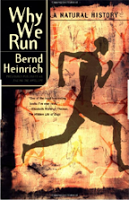Last week I took on a media article that equated a glass of wine with an hour at the gym in terms of heath benefits. That article was a case of mangled reporting of scientific research (the lead author even addressed it). This week I’ve seen a number of media articles come out about another study, this time addressing the benefits of light, moderate, and strenuous running. As an example, the BBC published a story with the headline: “Too much jogging ‘as bad as no exercise at all.” And the Daily Mail writes: “Stop that binge jogging! Three times a week is best for you… and too much is as bad as doing nothing.”
I hope to get ahold of the text of this study, and had planned on writing about it myself as there are some clear issues with the interpretation of the results. However, Alex Hutchinson has already done the job and I thought I’d refer you to his take-down for an interesting and thoughtful read.
I particularly like this passage:
“Yes, the conclusion of the study (that “strenuous” jogging is as bad as being sedentary) is based on two deaths over more than a decade of follow-up. (Thank goodness a third person didn’t die, or public health authorities would be banning jogging.)”
Yes, their conclusion that strenuous jogging is as risky as being sedentary is based on two deaths. Alex expands on this, and addresses other issues as well. Head over to Runner’s World to read his full analysis.
Update: For another insightful look at this study, read this article by Larry Husten at Forbes.com. Love the final paragraph:
“Journalists and scientists have an obligation to fairly and accurately report the results of individual studies, and they have the further obligation to place those results in the context of what is already known in the field. By reporting the results of this one quite limited study with little or no critical perspective of its details or the larger context of the research, they have once again helped perpetuate the scientific illiteracy and innumeracy that is fast becoming one of the hallmarks of our time.”


















I’ve yet to read the actual study referenced in the article, but assuming Hutchison is right about the shaky inferences the researchers made based on their data, I have to wonder how the article made it past the editors of the Journal of the American College of Cardiology. Were they just not paying attention to the math?
All that said, I know that a couple of reputable studies from a few years ago did draw a statistical link between (clinically asymptomatic) myocardial fibrosis and repeated training for “extreme” endurance sports, so there is probably such a thing as “too much running” for one’s health. I just don’t think the Journal of the American College of Cardiology article proves it.
Heh, out of curiosity, I went and checked those findings linking myocardial fibrosis/scarring with endurance sport training and it turns out they’ve yet to be peer-reviewed. I guess even the jury’s still out on that one, too.
“By reporting the results of this one quite limited study… they have once again helped perpetuate the scientific illiteracy and innumeracy that is fast becoming one of the hallmarks of our time.” – This also describes the foundation of the now billion dollar gluten free industry that spun up after a researcher did one study and used the word “might”.
Writing in the internet age is all about getting hits and little about accuracy.
Anything to excess seems not to be healthy – from chocolate bars to sports.
Sad but true.
This is why I take all media reports lightly. :)